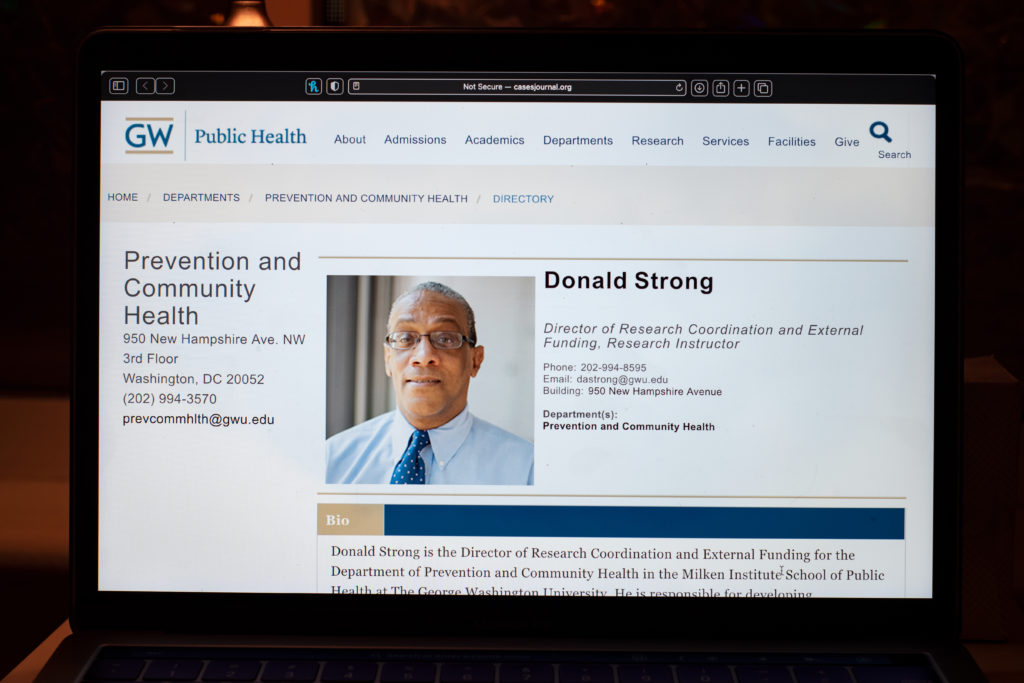Donald Strong, a faculty member who was integral in growing the Milken Institute School of Public Health’s relationships with community health organizations, died Oct. 29. He was 62.
Strong served as the director of research coordination and external funding for the Department of Prevention and Community Health to develop relationships with local and state government entities, connecting faculty with research and training opportunities at agencies like the U.S. Department of Health and Human Services and the D.C. Department of Health. Milken faculty and staff who worked with Strong said the GW community will remember him for his enthusiastic character and passion to help others despite the severity of his own health difficulties.
Lynn Goldman, the dean of the public health school, said the GW community will miss Strong, who cared deeply for his colleagues and students “more than words can express,” in a newsletter she sent to the prevention and community health department earlier this month. She said Strong advanced inclusivity and health equity through his work with local and community organizations as a leader, co-worker and “dear friend.”
“Don was a devoted member of our community who was instrumental in innovating and improving the experience for students at the GW Milken Institute School of Public Health,” Goldman said in the newsletter. “His dedication to the pursuit of health and equity is a testament and exemplar for all others to emulate and strive to achieve.”
Strong joined the department in 2013. He earned his bachelor’s degree from the University of Illinois, a master of business administration from Columbia University and a master of public health from GW.
Goldman said she will share details regarding Strong’s funeral and memorial service once she hears more from his family.
“He was a force of nature and our hallways will not be the same without his warm presence,” Goldman said.
Yolandra Hancock, a professorial lecturer of prevention and community health, said in the 20 years that Strong worked in the public health field, he was committed to using his professional relationships to help his students secure practicums and take advantage of opportunities in the D.C. area. Hancock said she remembers Strong reaching out to her often to ask whether she could connect some of his students with organizations and internships in her speciality of pediatrics.
“He didn’t just put students with any old body – he made sure that the students would be well taken care of, that they would really get something out of the opportunity that they’ve invested in with the money that they pay for tuition,” Hancock said.
She said Strong was one of the only people who would call her at midnight just to talk. Hancock said she remembers him calling her a week before he died when he dropped his brother off at the airport to tell her to be proud of herself.
“One of the last things he said to me was, ‘I’m just so proud of you because your work was not limited to who you were as a professor, and that’s not going to stop who you are as a change agent in this field. So no matter how people see you or treat you in academia, you continue to remember who the f— you are,” Hancock said.
Olga Acosta Price, an associate professor of prevention and community health and the director of the Center for Health and Health Care in Schools in Milken, said Strong was “boisterous” and enthusiastic.
Price said she once heard someone accurately describe Strong as the “soul of the department.”
“He’s really irreplaceable, and we’re going to miss him a lot,” Price said.
Mark Edberg, a professor of prevention and community health, said Strong helped with community engagement projects for centers like the University’s Avance Center, which focuses on developing projects to advance refugee and immigrant health.
Edberg said Strong would stop by his office and launch into loud and funny conversations during their time working together. He said he hopes people remember him for his strong personality.
“He was an incredibly resilient, optimistic and energetic person, even in the face of multiple, and I am talking about multiple health challenges,” Edberg said. “His will was indestructible.”
Gene Migliaccio, Milken’s associate dean of applied public health and a professor of global health, said Strong went to every health department in D.C., as well as health departments and hospitals in Maryland and Virginia, to build relationships with them and ask to help provide COVID-19 testing to their communities.
Migliaccio said once Strong established connections with hospitals and large non-governmental organizations that support local health departments, 200 to 300 students volunteered for a coronavirus task force to provide types of support like contact tracing.
“That single act in terms of setting up that volunteer task force and reaching out to community partners was phenomenal,” he said.
Karen McDonnell, an associate professor of prevention and community health, said she remembers delivering a presentation with Strong at the United Nations on female genital mutilation, an “emotionally heavy” subject matter.
“By the end of the session, Don had us all exchanging contact information and taking group photos,” McDonnell said in an email.
McDonnell said she knows GW, the public health field and Strong’s family will dearly miss him as the community mourns his loss.
“Don, my friend, I’m going to miss you,” McDonnell said. “May you rest in peace, and may your power be instilled in each of us to continue your mission.”








